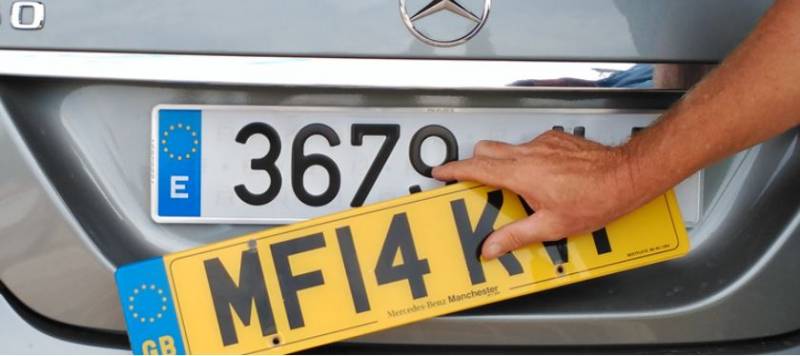Register a Foreign Vehicle in Spain Without the Stress And Anxiety: Complete Guide
Register a Foreign Vehicle in Spain Without the Stress And Anxiety: Complete Guide
Blog Article
Typical Challenges Faced During Foreign Car Registrations and How to Overcome Them
Navigating the complexities of foreign vehicle registrations can be an overwhelming task, laden with challenges that differ significantly across jurisdictions. Concerns such as understanding local policies, getting rid of language barriers in important paperwork, and fixing up inconsistencies in vehicle specifications commonly arise. Understanding tax obligation effects and compliance with safety and security standards can better make complex the procedure. By taking a look at reliable methods to attend to these obstacles, people can better place themselves for a smoother registration experience. The inquiry remains: what certain actions can be taken to reduce these common mistakes?

Recognizing Neighborhood Rules
Navigating the intricacies of international lorry registration starts with a complete understanding of neighborhood guidelines. Each country has its particular laws and requirements regulating the enrollment of lorries, which can vary significantly from one jurisdiction to an additional (Register a foreign Vehicle in Spain). It is essential for foreign automobile owners to familiarize themselves with these regulations to make certain compliance and stay clear of prospective penalties or legal complications

Additionally, some jurisdictions mandate lorry examinations to identify conformity with regional safety and emissions standards. This might demand adjustments to the car before it can be legitimately registered. Engaging with regional authorities or speaking with lawful professionals can offer clearness on these laws.
Language Obstacles in Documents
Language barriers present substantial obstacles when it involves the paperwork required for international automobile registration. Many people come across problems in recognizing the details needs described in regional laws, as these documents are frequently released in the official language of the host country. False impressions can lead to the submission of inaccurate or incomplete paperwork, leading to delays or denial of registration.
Moreover, essential records, such as title acts, proof of ownership, and insurance plan, may not have easily available translations - Register a foreign Vehicle in Spain. This can develop complication for foreign automobile owners who are unknown with the local terminology and legal lingo. Because of this, navigating the registration process ends up being troublesome, commonly requiring additional time and effort to guarantee compliance
To reduce these problems, it is a good idea for foreign vehicle owners to look for professional translation services or seek advice from regional professionals that can aid in understanding the requisite documentation. Additionally, government agencies might give multilingual resources or standards to assist in the enrollment procedure. Proactively dealing with language obstacles can improve the enrollment experience, guaranteeing that all required records are accurately ready and submitted in conformity with local regulations.
Automobile Requirements Disparities

Running into vehicle spec inconsistencies can produce considerable hurdles for foreign vehicle proprietors during the registration process. These inconsistencies typically emerge from differences in producing standards, measurement units, and regulatory requirements between the lorry's native land and the host country. For example, a car that satisfies safety and emissions criteria in one country may not straighten with the requirements needed for registration in an additional, causing delays or outright rejections.
To conquer these challenges, it is important for international lorry owners to carry out comprehensive research study prior to launching the enrollment process. This consists of recognizing the particular requirements set by the neighborhood authorities, such as safety and security criteria, exhausts levels, and any needed modifications. Engaging with an expert service concentrating on international vehicle registration can additionally supply beneficial insights and look at these guys support in browsing these discrepancies.
Paperwork plays an essential role, so making sure that all technological specs and modifications are precisely mirrored in the directory documents can alleviate problems. Additionally, preserving open interaction with regional enrollment authorities can give quality on any type of potential disparities, permitting prompt resolution and successful registration of the vehicle.
Browsing Tax Requirements
Recognizing the tax obligation requirements linked with international automobile registration is necessary for proprietors seeking to adhere to neighborhood policies. Each territory has specific tax obligations that have to be met before a car can be legally registered. These might include import obligations, value-added taxes (VAT), and annual vehicle tax obligations, which can differ dramatically depending upon the car's beginning, worth, and specifications.
To browse these tax obligation demands successfully, vehicle proprietors ought to begin by researching the particular taxes applicable in their area. Consulting with regional tax obligation authorities or a tax obligation specialist with experience in foreign automobile registrations can give quality on the procedure and prospective responsibilities.
Additionally, it is critical to maintain complete documentation of the lorry's purchase and any type of repayments made, as this will be essential for tax obligation computations and possible audits. Proprietors must additionally know any type of deadlines related to tax repayments to stay clear of fines or hold-ups in enrollment.
Inspection and Conformity Issues
Routinely addressing evaluation and compliance problems is vital for owners of international cars looking for to register them in a brand-new jurisdiction. Each region has unique laws regarding automobile safety and security, emissions, and adjustments, which can present considerable difficulties for owners not familiar with neighborhood criteria. Understanding these demands is vital to stay clear of delays and extra costs.
One usual issue emerges when international automobiles do not satisfy the host jurisdiction's security and discharges requirements. Proprietors ought to proactively verify that their automobiles abide by regional laws, which may include adjustments or acquiring required paperwork from producers. Additionally, numerous jurisdictions need an extensive assessment by a licensed facility, which can result in more issues if the vehicle stops working to satisfy specific standards.
To navigate these obstacles, owners can seek advice from regional car registration authorities or look for assistance from experts knowledgeable about the enrollment procedure. Preparing all needed documentation in breakthrough, consisting of previous examination reports and evidence of compliance, can simplify the registration process. Ultimately, complete prep work and recognition of inspection needs can significantly enhance the possibility of an effective international vehicle registration.
Verdict
In summary, the process of international vehicle enrollment involves various difficulties, consisting of comprehension of local policies, language obstacles in documents, disparities in vehicle specifications, navigation of tax obligation requirements, and examination and compliance problems. Resolving these difficulties requires persistent research, usage of expert translation services, and examination with local authorities. Involving specialized solutions can guarantee adherence to safety and security and emissions criteria, he said ultimately promoting a smoother registration procedure and conformity with all appropriate commitments.
Report this page